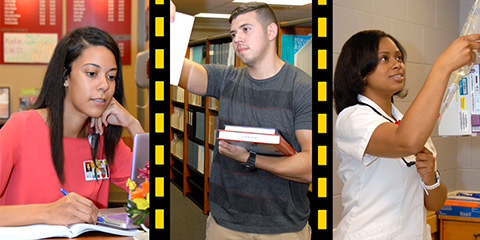After students get a solid basis in classwork and begin clinicals, the next big step to becoming a nurse is rising to meet the increased challenges of junior year, which involves more focused classwork and more time spent in patient areas. It takes more effort and the ability to juggle competing demands to turn the corner, but with planning and determination, it can be done. Junior year is also is the time when students start thinking about what they want to specialize in after earning their nursing degree.
"During their sophomore year, students learn the fundamentals of nursing. In the junior-level course Nursing 309, or Care of the Adult I, students learn the heart of medical-surgical care, which lays the foundation for all nursing specialties and sets the stage for students to consider areas of focus, like pediatrics or gerontology," said Barbara Barta, PhD, RN, associate dean for Undergraduate Programs.
“The biggest change that sticks out to me as a junior is you’re not with all of your fellow classmates as you were with in freshman and sophomore year. You end up developing new relationships and you start realizing that you’re not that far along from graduating, so you start working harder and become more intellectual, not only for yourself but for everyone that you want to care for,” said Yahya Musa.
“For me, the biggest change that sticks out as a junior here at MCCN is having two days of clinical. Last year we only had six hours and this year we have 12 hours a week. Also having an eight-week class is a big change. This year with an eight-week class I don't have time to correct any mistakes so the most challenging thing so far is staying focused for eight weeks,” said Brianna Payton.
Deja Scott agreed. “I had to cut my work hours to make sure that I have enough time to study for exams since half of junior classes are only eight weeks.”
Musa added, “There was not a big of adjustment for my classwork in general. There are different types of students. There are those who need to study all week in order to pass. There are those who study the day before and do incredible on test days, then there are those who study every second of the day because they want to pass and want to learn and memorize everything that was taught. That is the type of guy I am. The most challenging thing is nursing school; everyone knows that. Everything ends up being due at the same week. Sometimes your job may play a major factor in your schoolwork. Time management is the key,” he said.
With time allotted for class, clinicals and studying, juniors still find time for balance with outside activities.
“I sometimes attend the lunch-and-learns and I go to the festivals that are provided, but most importantly I hang out with all my nursing friends that I have made here at Mount Carmel,” said Payton.
Outside of class, Scott serves as president of the Student Nurses Association at Mount Carmel (SNAM), which is open to any student to join.
“I like to hang around with my friends and family whenever I have extra time on my hands. I love to workout,” said Musa.
With graduation in sight, juniors reconcile why they entered nursing with thoughts on what they would like to specialize in once they become full-fledged nurses.
“My eighty-year-old father was always in and out of the hospitals and I always thought nurses were the coolest people ever. I want to be an ER nurse. If it comes down to anything else, Ill be grateful if I get a job as a nurse anywhere in the hospital,” said Musa.
“When I was about two years old, I choked on a peppermint at a restaurant and there happened to be a nurse eating at a table nearby who performed the Heimlich maneuver on me and saved my life. Since that day I knew I wanted to be a nurse and save lives just like she saved mine,” said Scott. “I have three areas that I am considering specializing in, which are pediatric psych nursing, mother/infant or women's health education.”
“I have always wanted to become a nurse and now I am following my dreams. I am trying to keep an open mind as I go through all the different rotations here at MCCN but I am interested in pediatric or neonatal,” said Payton.
Musa, Payton and Scott offer these tips to students approaching their junior year:
“Plan ahead, use a planner and make a weekly schedule of things you want to get done and make sure you achieve those weekly goals,” said Payton.
“I would recommend a study schedule, have a planner and get involved in an on campus organization! These are great resume builders and you get to meet students from all different classes and build relationships with faculty,” said Scott.
Musa added, “The best advice that anyone can take from me is don’t wait until the last minute to turn something in. Don’t go out every weekend. Sleep is very important for students. Yes, nursing school is challenging, but we all need to make sacrifices because it will all pay off in the long run.”


